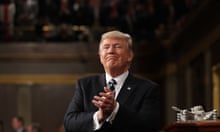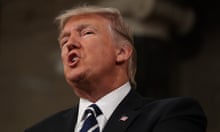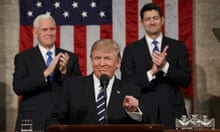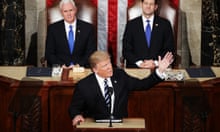Donald Trump promised a “new chapter of American greatness” in a speech to Congress that sought to reset relations with his opponents – but was swiftly condemned for inaccurate claims and a lack of detail.
In a scene that was unthinkable a year ago, when the businessman was a political novice facing much hostility in his own party, Trump gave his first address to senators and members of congress and received cheers as he attacked Barack Obama’s legacy.
The tone was arguably Trump’s most presidential yet, with the dark vision of “American carnage” in his inaugural address giving way to an attempt at an optimistic theme of “American greatness” as the country nears its 250th birthday in 2026.
The raw economic nationalism of his chief political strategist, Steve Bannon, was notably sweetened for politicians’ palates on both sides of the aisle. “This was Steve Bannon on steroids, with a smile,” Tom Perez, the new Democratic party chair, told the MSNBC channel later.
But there was audible dissent from Democrats when Trump derided Obama’s healthcare policy, claimed he was “draining the swamp” in Washington, called for an end to “trivial fights” – despite his regular Twitter spats – and said he was setting up a group to represent victims of crimes committed by immigrants.
Trump, wearing a blue and white striped tie instead of his trademark red, entered the House chamber to cheers from Republican members, a smile from the House speaker, Paul Ryan, and grin from Vice-President Mike Pence. Many Democratic women wore white, a nod to the suffrage movement and the ongoing struggle for equality. It was a scene utterly transformed from Obama’s final state of the union address last year.
“I am here tonight to deliver a message of unity and strength, and it is a message deeply delivered from my heart,” Trump said, sticking fairly closely to a prepared text. “A new chapter of American greatness is now beginning. A new national pride is sweeping across our nation. And a new surge of optimism is placing impossible dreams firmly within our grasp. What we are witnessing today is the renewal of the American spirit,” he claimed.

Trump mourned what he called the mistakes of recent decades: a shrinking middle class, inner city decline, open borders, spending trillions overseas. But, he said, the earth shifted beneath our feet in 2016 – there was a “rebellion” with a crucial demand, “that America must put its own citizens first ... because only then can we truly make America great again”.
Trump pointed with his finger, Republicans rose to applaud and Democrats sat unmoved as the president painted a rosy future. “Dying industries will come roaring back to life. Heroic veterans will get the care they so desperately need. Our military will be given the resources its brave warriors so richly deserve.
“Crumbling infrastructure will be replaced with new roads, bridges, tunnels, airports and railways gleaming across our very, very beautiful land. Our terrible drug epidemic will slow down and ultimately stop. And our neglected inner cities will see a rebirth of hope, safety, and opportunity. Above all else, we will keep our promises to the American people.”
Trump claimed that since his inauguration, numerous companies had announced that they would invest “billions and billions of dollars” in the US and create tens of thousands of new jobs. But a Bloomberg analysis has found most of these cases predate Trump, do not actually create jobs, or have nothing to do with him.
When the president claimed he had already begun to “drain the swamp” of government corruption, there was some sarcastic laughter from Democrats, who could see in attendance his cabinet, with its strong Wall Street and boardroom connections.
Trump repeated his promise to soon begin the construction of “a great, great wall” on the Mexican border and said gang members, drug dealers and criminals were currently being deported. “Bad ones are going out as I speak tonight,” he said.
In a marked shift from Obama, he used the phrase “radical Islamic terrorism” with relish, pausing after each word for dramatic effect, when promising to protect the American people.
He did not seek to defend his travel ban in detail – a new version is expected on Wednesday – but he defended the principle: “It is not compassionate, but reckless, to allow uncontrolled entry from places where proper vetting cannot occur ... We cannot allow a beachhead of terrorism to form inside America – we cannot allow our nation to become a sanctuary for extremists.”
Trump then shifted to claim he had inherited a mess: from 94 million Americans out of the labour force (this appears to include retired people and students), to high national debt, to a trade deficit of nearly $800bn to “tragic foreign policy disasters”.
He attempted to strike a conciliatory, bipartisan note, gesturing towards Democrats as he said: “Solving these, and so many other pressing problems, will require us to work past the differences of party.”
But soon enough there was a dubious claim. “Right now, American companies are taxed at one of the highest rates anywhere in the world.” In fact, the US is not even in the 30 highest-taxed nations in the world, according to the Organization for Economic Cooperation and Development.
“My economic team is developing historic tax reform that will reduce the tax rate on our companies so they can compete and thrive anywhere and with anyone. It will be a big, big cut. At the same time, we will provide massive tax relief for the middle class.”
A conservative thinktank, the Tax Foundation, has found half of Trump’s tax cuts would go to the top 1% of earners, while most families below the top 20% of earners would have income gains of less than 1%.
Trump recalled the former president Dwight Eisenhower for initiating the last truly big national infrastructure programme – the building of the interstate highway system. “The time has come for a new programme of national rebuilding,” he said. “I will be asking the Congress to approve legislation that produces a $1tn investment in the infrastructure of the United States – financed through both public and private capital – creating millions of new jobs.”
However, Chuck Schumer, the Democratic minority leader in the Senate, said after the speech that he had submitted an infrastructure proposal to Trump and heard nothing back. “The speech and the reality have never been more detached in a presidential speech,” he told MSNBC. “What the president says and what the president does are almost at opposite ends.”
Trump gave Democrats futher cause for grievance by hammering Obamacare, prompting Republicans to stand and cheer. “I am calling on all Democrats and Republicans in the Congress to work with us to save Americans from this imploding Obamacare disaster,” he said, gesturing towards the disgruntled Democrats, two of whom gave a thumbs down sign.
In an attempt to be upbeat, Trump said: “Everything that is broken in our country can be fixed. Every problem can be solved. And every hurting family can find healing, and hope.
“Our citizens deserve this, and so much more – so why not join forces to finally get the job done and get it done right? On this and so many other things, Democrats and Republicans should get together and unite for the good of our country, and for the good of the American people.”
It was a plea that echoed Obama’s own dismay at the ugly and rancourous divisions in Washington. Trump said he wanted to work with both parties to make childcare accessible and affordable, to help ensure new parents have paid family leave, to invest in women’s health and to promote clean air and clear water – yet hours earlier, Trump had signed an executive order to review the clean water rule, designed by Obama to protect streams, wetlands and sources of drinking water.
Trump began by deploring attacks on Jewish cemeteries and an apparently racist murder in Kansas, describing the US as a country divided on policies but “united in condemning hate and evil in all its forms”. However, he made little reference to race except to call for both parties to pass an education bill that funds school choice for disadvantaged youth, including millions of African American and Latino children. “Education is the civil rights issue of our time.”
He also made clear his law and order priorities, albeit in more measured tones than on the campaign trail. “We must work with – not against, not against – the men and women of law enforcement,” he said. “We must build bridges of cooperation and trust – not drive the wedge of disunity and division. It’s pure unadulterated division. We have to unify.”
However, there were groans from Democrats when Trump said he had asked the Department of Homeland Security to create an office to serve American victims, known as Voice – Victims Of Immigration Crime Engagement. “We are providing a voice to those who have been ignored by our media, and silenced by special interests.”
Just as at last year’s Republican national convention, the families of victims were in the public gallery. But the biggest applause, and most poignant moment of the night, came when Trump singled out Carryn Owens, the widow of a US Navy Seal, Ryan Owens, killed in a controversial raid in Yemen.
“Ryan’s legacy is etched into eternity,” Trump said. Carryn Owens sobbed and gazed heavenward, whispering “love you” as Trump’s daughter Ivanka sought to console her and Congress stood and applauded for long moments.
Trump added: “And Ryan is looking down right now, you know that, and he’s very happy because I think he just broke a record.”
The president reaffirmed America’s support for Nato despite having cast doubt on the organisation in the past. He said its partners must meet their financial obligations. “And now, based on our very strong and frank discussions, they are beginning to do just that.” He went off script to add: “In fact, I can tell you the money is pouring in.”
Summing up, Trump returned to the theme of America’s approaching 250th anniversary. “When we celebrate our 250 years of glorious freedom, we will look back on tonight as when this new chapter of American greatness began,” he said. “The time for small thinking is over.”
The president who has clashed with gold star families, Miss Universe and celebrities on Twitter, as well as waging war on the media over the size of his inauguration crowd, added: “The time for trivial fights is behind us.”








